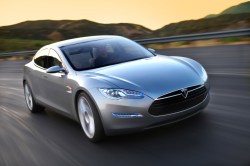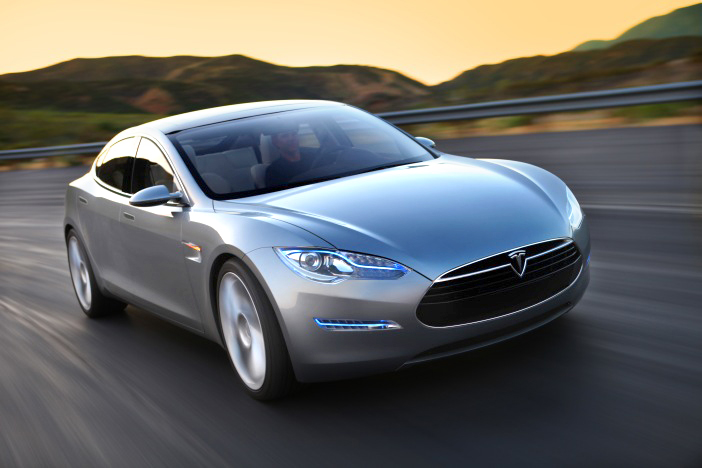
A Tesla Model S widget.
Last week, reporter John Broder of The New York Times wrote an account of his road trip from Washington, D.C., to Milford, Conn., in Tesla’s new all-electric Model S sedan, using the two Superchargers that the company has set up along the route. Broder says he got less range than advertised, lost a bunch of range overnight inexplicably, and ran out of power on his last leg. Elon Musk, CEO of Tesla, published a response to the story, effectively accusing Broder of journalistic malpractice.
Broder responded to Musk, and then responded again. Rebecca Greenfield at the Atlantic Wire also responded, charging that Musk hadn’t established his case against Broder. TechCrunch weighed in. Twice. Also GigaOm. Also Boing Boing. Even Gawker piped up. And of course our own Philip Bump.
This seems like an awful lot of attention devoted to the precise performance characteristics of this particular vehicle on this particular trip. The Tesla S has been extensively and mostly positively reviewed in lots of other outlets (including the NYT itself). It’s pretty well-established what it can and can’t do. What really seems to be behind this, yet again, is a proxy argument over electric cars in general.
Kevin Bullis has the wisest comment on this dust-up, which is that it’s dumb for an electric car to compete in the “drive a really long way without stopping much” category, precisely the place where gas cars currently retain an advantage. Broder made a bunch of mistakes, in retrospect. He could have done the drive without trouble if he’d planned better, been more careful, and gotten better advice from Tesla personnel. But American drivers are not accustomed to low speeds or careful planning in their long-distance driving and it will take time for those habits to change. It would make more sense to highlight the car’s performance in applications where it shines, like commuting, which constitutes the vast bulk of Americans’ actual travel.
Lurking in the background is the notion that the “promise of electric cars” is false until an electric car can plop down in America’s current transportation system and do everything an internal-combustion-engine car can do. Broder encourages this way of thinking, but then, so does Musk, and so even does Energy Secretary Steven Chu.
It’s a dumb notion, though, a classic example of our obsession with widgets over systems. It is probably true that electric cars will never be able to replace gas cars, if the cars themselves — the widgets — are the only thing we replace. The entire system was designed and built around ICE cars. Turns out it’s difficult to build a luxurious, two-ton armored tank that can travel 300 miles on a quick-charging battery pack.
The problem, however, is not merely that our cars consume too much oil. It’s that our transportation system consumes too much oil. A better system won’t merely involve better cars, it will involve driving less, telecommuting more, using more public transportation, sharing cars, making cars smarter, and building more and better electrical infrastructure.
There are a lot of chicken-and-egg problems in there. It’s hard to change behavior without the tech in place, it’s hard to develop the tech without supportive public policy, and it’s hard to get supportive public policy when the tech and behaviors aren’t there yet. Changing one part of the system without changing a bunch of other parts simultaneously is challenging and can often, at least temporarily, look like a step backward. (Don’t reduce my range, bro!) System change is difficult, halting, and messy.
The reason the conservative movement relentlessly attacks electric cars is not that they dispute particular performance characteristics in particular circumstances. It’s that they don’t want to change the system. They like the oil/SUV/sprawl set-up and are quite overt about it.
The status quo bias displayed by journalists like Broder, by contrast, more often manifests as narrow, widget-focused thinking, on which basis he’s been an an electric car naysayer for some time now. (See also The New York Times’ Matt Wald on clean energy.)
Of course Broder and Musk should both tell the truth. Battle it out on tech blogs all day! But the resolution of this dispute says roughly nothing about the need for, or the promise of, systemic changes in U.S. transportation. Electric vehicles are one piece of a complex puzzle. They may not “fulfill their promise” until other parts are in place. All those pieces will coevolve in unpredictable ways.
The baseline question, though, is whether the current system is sustainable, and if it isn’t, how it can be made so. Widget-based proxy arguments don’t do much to illuminate that question.



